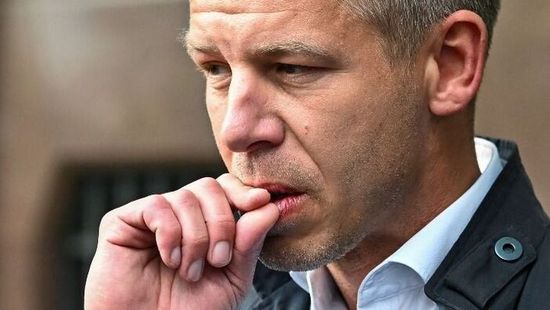Ez is napvilágot látott: Magyar Péter tudhatta, milyen bosszút forralnak Magyarország ellen

A szakértő szerint közölték a Tisza Párt elnökével, mi a feltétele a hivatalban maradásának.

"Any putative norm must have broad consensus within the context of a plural world with very diverse political, economic and social settings. It cannot be the lopsided imposition by a powerful or vocal elite as this would be an act of disenfranchisement" - pointed out by Professor Thio Li-ann in a conversation with Lénárd Sándor.

We celebrate the 75th anniversary of the adoption of the Universal Declaration of Human Rights (UDHR). The UDHR is a remarkable achievement as it reflects a consensus among various nations with differing historical, religious, political, and cultural traditions. How do you see the historic of this document?
In retrospect, it was remarkable that it was even adopted in 1948, just before the advent of the Cold War which would have scuttled the project. It was a

truly ‘universal’ document, applying to all persons including those in colonial territories,
as evident in article 2. Asians and persons from other smaller and medium sized countries had a role in formulating Article 2. Even though many former colonial territories did not participate in its drafting, all have subsequently had a chance to reaffirm the UDHR, as reflected in seminal documents like the 1993 Vienna Declaration and Programme of Action. So most Asian countries accept the UDHR as a starting point for the conversation about human rights. I have no knowledge of any state who has formally rejected the UDHR, so it is a commonly accepted baseline human rights document.
On the other hand, we live in a world in which claims of human rights are burgeoning, as Jonathan Sacks pointed out human rights has become the dominant mode of discourse. However, if everything is a human right then nothing is a human right. Have you faced with this challenge in Asia and if so how, in your view one can distinguish between true and a false human rights?
Since the time of the adoption of the UDHR, claims rights have proliferated. Because the ideal of universal human rights as embodied in the UDHR was so successful, everyone wants to piggyback on this concept, to gain legitimacy by association through framing what might be a political claim as a human right, a legal right. And yes,
if everything is a human right, this diminishes the currency of genuine widely accepted human rights,
as distinct from contested human rights claims. As the world is so globalized and inter-connected, the same kinds of strategies by human rights activists are present in every part of the World; clearly, so courts in Asia have faced such cases. For instance, the Philippine Supreme Court had a case where the Philippines Commission on Human Rights had sought a motion to intervene in arguing that to deny the petition of a homosexual rights group which had been denied accreditation as a party-list organization on moral grounds would violate UDHR principles. In the course of the proceedings, the petitioners invoked the Yogyakarta Principles on Sexual Orientation and Gender Identity which was issued by a group of experts in their private capacity. The authors of the Yogyakarta Principles consider this to be an authoritative way of reading new content into existing equality clauses, while others consider this to be an attempt to impose a contentious political agenda, as there is no explicit human rights provision in an international treaty, as distinct from regional instruments or municipal law, which relates to discrimination on grounds of sexual orientation – this has not been debated by states internationally in an authoritative forum. The Supreme Court applied the international law on sources embodied in article 38 (1), Statute of the ICJ, noting the petition had not “undertaken any objective and rigorous analysis of these alleged principles of international law to ascertain their true status.” They noted that not everything a segment of society wants or demands is “automatically a human right”, and calling any favoured desire or want a right would dilute real human rights. They concluded that the Yogyakarta Principles were at best de lege ferenda, and non-binding. They noted that these sorts of social issues were “emotionally charged”, expressing trust “that our democracy is resilient enough to withstand vigorous debate.”
So how should we distinguish between true and false claims of rights? We have debates in the political realm which is an open-ended discussion. Since we are talking as international lawyers, one has to apply certain requirements in relation to the juridical status of a norm, but the problem is that there is no formal law-making process. A norm is not a human rights norm just because an expert or some committee says it is – none of these have binding adjudicatory authority. Perhaps the best hope is the General Assembly – a very political body – if it can obtain consensus, that is indicative of very broad support. I think there has to be some integrity in the process and there is no doubt that governments have to have a role in it, though non-state voices must also factor in. Any putative norm must have broad consensus within the context of a plural world with very diverse political, economic and social settings.
It cannot be the lopsided imposition by a powerful or vocal elite as this would be an act of disenfranchisement.
The more claims of rights there are, the more clashes with existing established rights, and the greater the skepticism of rights claims, which may weaken the authority and normative purchase of established rights. For example, one may claim using an equality argument, that homosexuality should be promote in public school education. Parents may well object to this, as it may violate their moral or religious convictions. This would be contrary to Article 26 of the UDHR which provides for the right of parents to choose the type of education their children should have, including sex education. So, whose convictions should prevail? If you use the term “right” as a rhetorical trump card to shut down debates over controversial issues, this would erode the legitimacy of human rights and human rights standard-setting. There needs to be some sort of procedure by which we can ascertain whether a putative right enjoys that very high degree of supportive consensus and this must include a forum for fair and robust debate in substantial terms, as to whether that right is normatively desirable and how it interacts with the existing human rights corpus, whether it denudes other rights, for example. Questions of priority are never easy but they cannot be avoided, as that would constitute a kind of power-grab.
The famous French Catholic philosopher, Jacques Maritain once said regarding the UDHR that “many different kinds of music could be played on the document’s thirty strings.” However, many are of the opinion that there should be a single and unified model of human rights regime for the entire world; this is what universality means and what the transnational character of human rights demands. How could uniformity and universality be rightly distinguished?
In the Asian context, there are sometimes critiques raised that human rights are not universal but ‘Western’, the philosophy of liberal individualism and therefore a form of moral or neo-colonial imperialism. Colonialism to us is a human rights violation insofar as it deprives us of the right to choose our own government and our way of life. Colonialism is therefore something that is seen to represent “uniformity”, a ‘one size fits all’ approach to life, liberty and the pursuit of happiness -someone telling us how to organize our life or society. A type of human rights imperialism. But we must have standards, universal standards, if not these sorts of arguments can be manipulated to justify abuses of power, which we must always guard against.
I think a two-tier approach would be helpful. As you mentioned, there is today both the proliferation and politicization of human rights, to advance political agendas which are controversial because there is lack of widespread agreement. There are clearly, core human rights which everyone agrees about such as the prohibition of genocide or torture; for these rights – no derogation should be allowed. However,
when it comes to contested human rights, subsidiarity will play a significant role.
Even the European Court of Human Rights has a so called “margin of appreciation”, such as in relation to the same-sex marriage case. There is no European consensus on this issue, so it is left to be sorted out by democratic politics. If there is no European consensus, you can bet there is no global consensus. It stands to reason that it is important to recognize a global margin of appreciation to manage these sorts of issues, in our very diverse world. If not, you could have well-funded and engaged activists seeking to universalise their agenda by clothing it with the legitimacy of the term, universal human rights, when there is no universal support for it, nor opportunity for evaluation, argument and counter-argument.
Such dissensus exists not only in the championing of new rights, but also how well-established rights like free speech are interpreted. This is certainly shaped by context, and libertarian readings of free speech (eg in the USA) are the outliers, not the mainstream. Contrast the USA approach towards political libel with that of other commonwealth jurisdictions, for example. Or laws that sanction the ‘wounding of religious feelings’ which would be unheard of in the USA but not elsewhere. Other Asian countries like Thailand have strict lese majeste laws which prohibit ‘royal defamation’ which many consider to fall below international protective standards. These are difficult issues – how are we to resolve it? I am against a free-fall into cultural relativism because wicked things can be legitimized in the name of culture, ideology or religion. We cannot evade the struggle; how do we distinguish good and evil, can we invoke these terms in a plural and postmodern age? Does anyone have a silver bullet, it would solve a lot of headaches. I think human rights can play a role in setting out the contours of legitimate and illegitimate departures from a general norm, the parameters of the permissible, rather than stipulating ‘one right way.’ Human rights must prohibit violations of core human rights and yes, I recognize that too may be debated, and it must figure out what lies in the penumbra, what is a contested right which may be better resolved through national democratic process rather than a diktat from ‘on high’.
What is the function of the principle of subsidiarity in human rights and why is the Asian perspective on human rights unique?
First of all, there is no single Asian perspective. It is better to speak of ‘values in Asia’, just as there are diverse ‘values in Europe.’ Asia is a very diverse continent, where there are peoples and groups with liberal, communitarian, religious, capitalist, communist, statist worldviews. So as far as Asia is concerned, I think it is fair broadly to say that we take our communities very seriously and we do not necessarily accept the idea that individuals are isolated monads as the dominant American or liberal approach believes. I might add that
the vision of the human person envisaged in the UDHR is not that of the libertarian atomistic individual.
It is quite close to a more dignitarian approach, which Europeans may be familiar with, where the human person is not alone but pictured in solidarity, brotherhood, family. There are almost 200 countries around the world and they do have different cultures as well as a commitment to common standards – it is something held in tension. I think cultural particularity should be cherished so long as they elevate accepted universal human rights standards and we should always be wary of those who might invoke culture in a self-interested fashion to preserve power, or to grab power. To avoid or to mitigate the perspective that human rights is itself a culture, specifically, a liberal individualist culture, rather than an abstract objective reality or universalist claim, we have to navigate the difficult terrain between universal values which we all share, and differentiate these from ‘tribal’ or particularist values which we do not share, some of which may be acceptable, and some not. This is a difficult conversation to have, but a necessary one, a shared commitment to inclusive deliberation is something to be aspired towards.
What is the importance of the nation-states and national sovereignty in securing human rights?
This is a tricky question because when the international protection of human rights was adopted after the Second World War, the basic idea was to discipline the states that became very abusive. This is clear in the case of civil and political rights. But when you think of the social, economic and cultural rights or even the third generation rights like the right to development, it is not possible to accomplish them without positive state action, in tandem with international cooperation. For example, think about how to secure an adequate standard of living, the right to housing, the right to health.
Human rights at the same time both limit and empower the state,
depending on whether one is dealing with negative or positive rights. The State can both secure or abuse your human rights. This is a tension which we have to realize and manage. While the European West may practice an advanced form of ‘supranationalism’, the sovereign centric state is not dead elsewhere. When it comes to questions of public power, ultimately, much boils down to who is running the system, and whether there are checks and balances, guidelines and aspirations towards securing a free and just society.
What are the principal “lessons to be learnrd” from past 75 years of the UDHR?
I very much agree with the idea that the language and practice of human rights is very useful in identifying what the human person needs and wants and aspires to – human rights are a dominate way of framing how we discuss and envisage human flourishing, the good life, the good society – though there are other ways to discuss this beyond rights claims e.g. relational perspectives on right relationships, the ethic of suffering and sacrifice, of care and humanitarianism. For good reasons, Elie Wiesel described human rights in the UDHR as a ‘world-wide secular religion.’
But even though it is such an important moral language as well as legal framework, the project continues, and foundational questions still arise which have not been settled, maybe they can never be, maybe it is not even a good idea to give every right the cast of an immutable absolute. For example, how do you know what a human right is, unless you first know what a human person is. Think about this clash in the context of the right to life and the right to abortion as part of reproductive rights. This is absolutely crucial. I would come down on the side of the preciousness of life and recognize the right of the unborn person just as we recognize the importance of inter-generational equity in environmental law and sustainable development, which is effectively recognising the legitimate interest of the constituency of the unborn. Many would agree with me on this stance, passionately, just as many would disagree with the stance, equally passionately. But, who is right?
Why do we have human rights in the first place? There is no clear consensus. We could justify it by reference to human origins, divine theories, human nature, e.g. Kantian categorical imperative, human necessity and the memory of human horror like the Holocaust and Japanese Occupation in my own country, the sheer utility of rights claims in empowering the powerless…but our foundational assumptions well affect the shape, content and interpretation of human rights – and it is clear we do not share foundational assumptions. Do we resort to ‘overlapping consensus’? Are we resigned to incommensurables where the winner will win not by conviction but coercion?
But I agree that
human rights is and should be a common language from which we can start our conversations about human flourishing, liberty and welfare.
Brierly once remarked that international law lacked ‘spiritual cohesion’, and perhaps, human rights can address this to some extent, if there is universal participation in this discourse, as distinct from being the language of a cultural elite, it can have this spiritual effect of international law.
Human rights should promote inclusive deliberation, civilizing debates and viewpoint diversity, as distinct from strident cancel culture which is just a grab for power to dominate and subjugate;
it should promote reason, conscience, convictions, good-will, maybe even friendly relations in seeing our common humanity, including the humanity of those we may disagree with.
I think we will continue to have the human rights debates that the framers of the UDHR tussled with in 1947-1948, and that is no bad thing if we can have these dialogues in a civil and civilizing fashion; if we share this global moral language while recognising there are regional dialects, we may do some good and prevent some evil and so prove the worthiness of the human rights enterprise. There is no need for human rights in a morally pristine and abstract universe, but ours is an imperfect world, and therein lies the utility of human rights, notwithstanding the controversies and ambiguities it sometimes engenders.